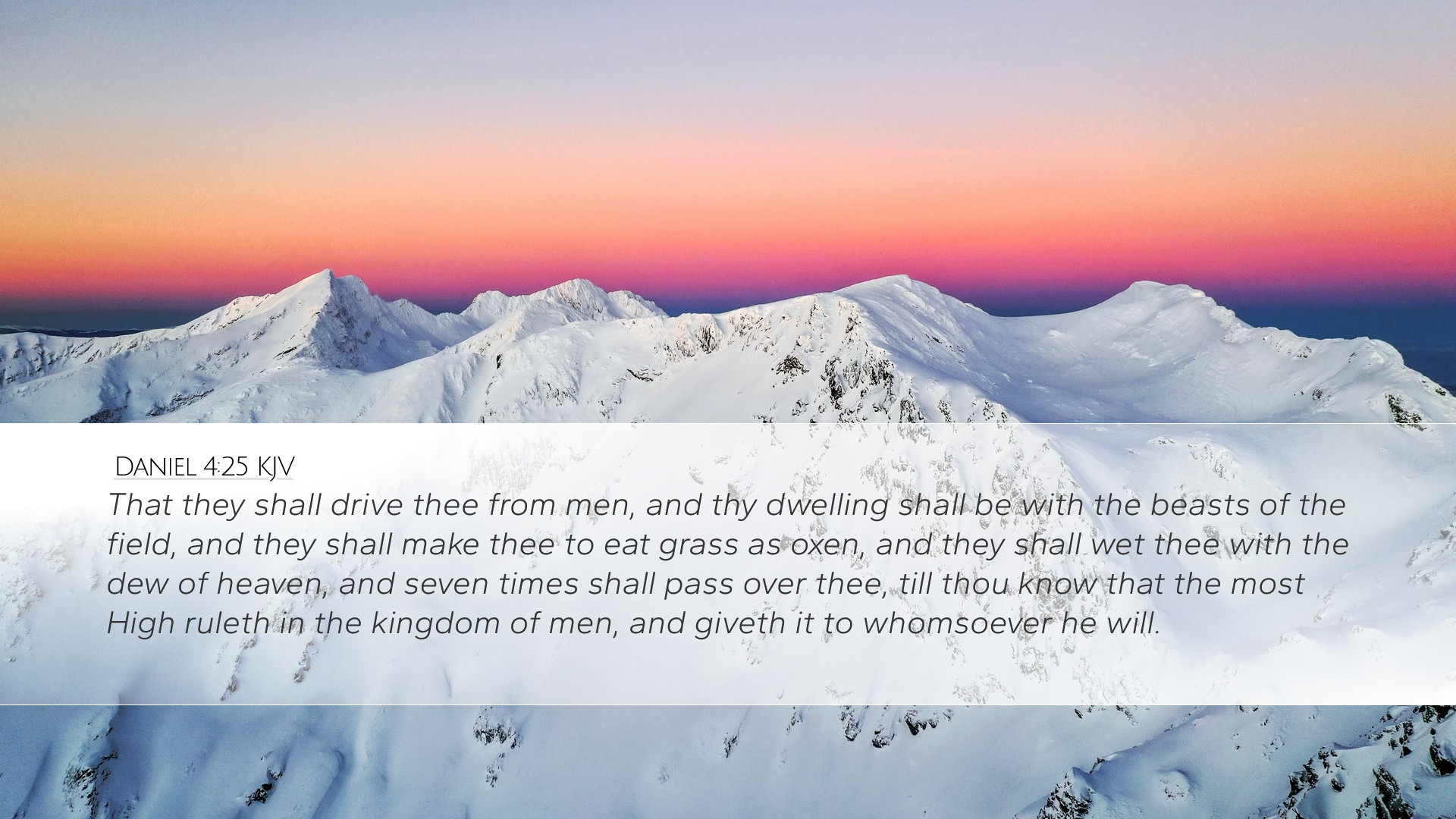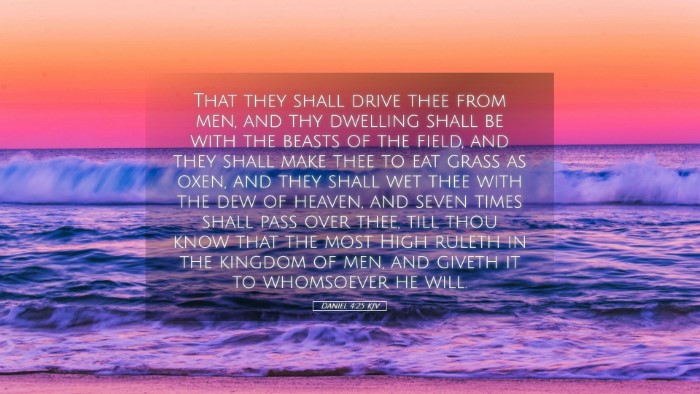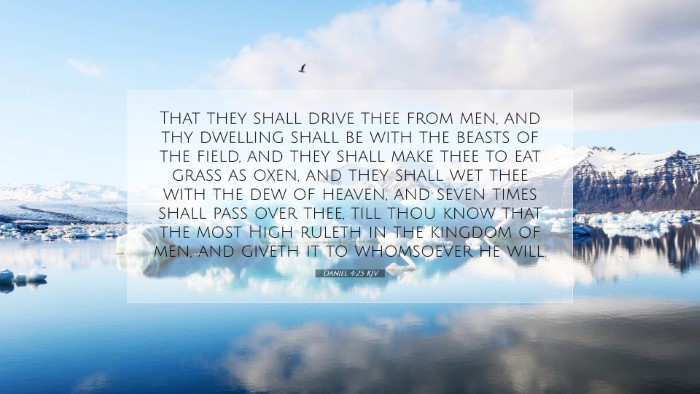Commentary on Daniel 4:25
Daniel 4:25 presents a profound warning in the narrative of King Nebuchadnezzar’s dream and its interpretation. This verse serves as a central theme in the larger context of the chapter, where the sovereignty of God over human affairs is paramount. The verse states:
"That they shall drive thee from men, and thy dwelling shall be with the beasts of the field, and they shall make thee to eat grass as oxen, and seven times shall pass over thee, till thou know that the most High ruleth in the kingdom of men, and giveth it to whomsoever he will." (KJV)
Contextual Background
The chapter depicts a royal vision experienced by Nebuchadnezzar, who, despite his immense power, is confronted with the reality of divine authority. This notable event is an exemplary narrative that showcases God's control over human destinies, emphasizing themes of pride, humility, and restoration.
Insights from Public Domain Commentaries
Matthew Henry's Commentary
Matthew Henry provides a detailed exposition, emphasizing the pride of Nebuchadnezzar as a warning for all rulers. He notes that the king’s arrogance led him to forget the divine authority that undergirded his success. Henry asserts:
"Pride is the bane of the soul. When we think ourselves above others, we are headed for a great fall. Nebuchadnezzar's punishment is a stern reminder of the consequences of neglecting the sovereignty of God."
Henry elaborates that God’s intention is to humble the proud and to demonstrate His power over all creation. The king’s transformation into a beast represents the loss of his royal dignity and sanity, illustrating the drastic measures God may take to turn a heart back to Him.
Albert Barnes' Notes on the Bible
Albert Barnes emphasizes the phrase “the most High ruleth in the kingdom of men.” He interprets it as a declaration of the supremacy of God, claiming that all human authority is ultimately conditional and subject to divine will. Barnes asserts:
"This verse illustrates a fundamental biblical principle: the ultimate authority of God over earthly kingdoms. The king is driven to live like an animal, signifying that without divine oversight, even the rulers are no more than creatures in God's vast creation."
Barnes also points to the metaphorical significance of eating grass, recognizing it as a symbol of Nebuchadnezzar's degradation and the return to a state of primal need, thereby highlighting the stark contrast between human pride and God’s eternal kingship.
Adam Clarke's Commentary
Adam Clarke delves into the prophetic implications of the dream, emphasizing the "seven times" that denote a period of divine discipline. Clarke interprets this duration as a form of God's purging process that ultimately leads to restoration:
"The period of discipline serves not merely as punishment but as a necessary prelude to redemption. God's dealings with us may seem harsh, but they are always aimed at our salvation and restoration."
Clarke explains that the transformation of Nebuchadnezzar serves to display the majesty of God. He also points out how God’s demand for recognition by His servant underscores the importance of acknowledgment of divine authority in administering justice and mercy on earth.
Theological Reflections
This verse encapsulates the critical theological theme of God's sovereignty. For theologians and scholars, it invites reflection on several key concepts:
- The Sovereignty of God: The biblical assertion that God has ultimate control over the universe, including kings and kingdoms.
- Human Pride: A theological exploration of pride as a root sin that distorts one's relationship with God.
- Divine Discipline: Understanding disciplinary actions from God not as mere punishment, but as loving interventions intended to restore and correct.
- Restoration Narratives: The promise of restoration after humbling, reminding believers that God desires to bring His creations back into fellowship with Him.
Practical Applications for Pastoral Ministry
For pastors and those engaged in ministry, Daniel 4:25 offers rich insights for preaching and teaching:
- Warning Against Pride: Preach the dangers of pride and the necessity of humility before God, using Nebuchadnezzar as a cautionary tale.
- Encouragement for the Oppressed: Use the narrative as an encouragement that God is sovereign even over difficult circumstances and will ultimately bring justice.
- Hope in Restoration: Emphasize the redemptive aspect of God's discipline, assuring congregants that God desires to restore those who humble themselves.
- Authority and Responsibility: Teach on the responsibility that comes with authority, reminding leaders of their accountability to God for their actions.
Conclusion
Daniel 4:25 serves as a potent reminder of the supremacy of God in a world often driven by pride and self-sufficiency. Through the lens of historical narrative and prophetic warning, this verse encourages believers to recognize God's sovereign rule and to lead lives of humility and dependence upon Him.


